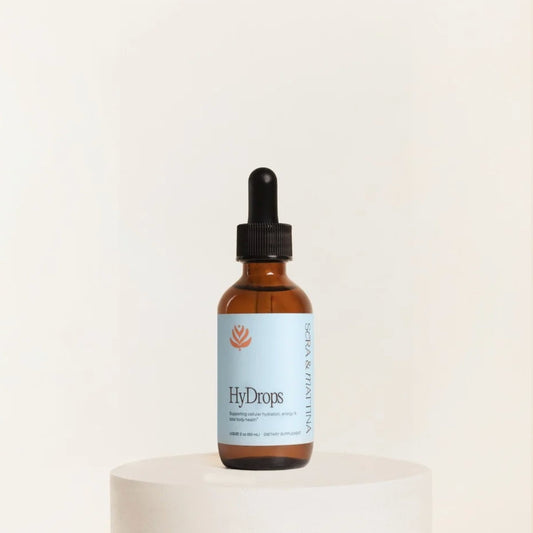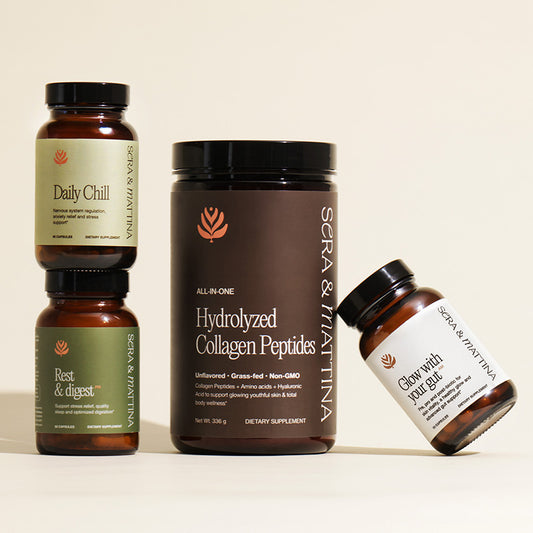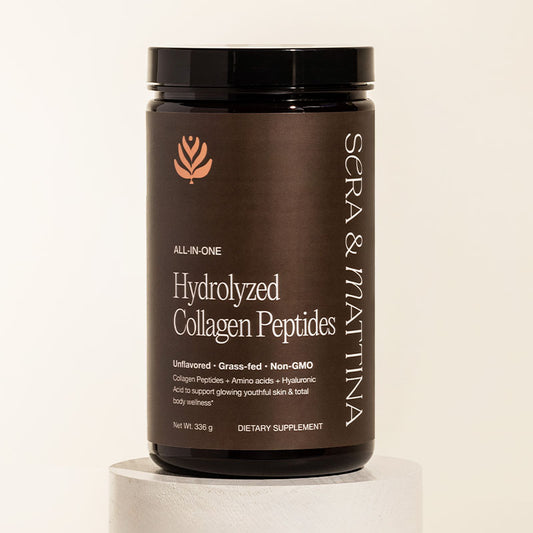Collagen is the structural protein that acts like the body’s “scaffolding,” providing support to skin, joints, bones, muscles, and connective tissues. It’s abundant when we’re young, but natural production slows with age, starting as early as our mid-20s. The visible signs include fine lines, reduced skin elasticity, joint stiffness, and slower recovery from physical activity.
Supplementation is a great way to help our body keep up and our bodies healthy, but not all collagen forms are absorbed equally. This is where hydrolyzed collagen peptides stand out. Because these formulas have a smaller molecular size, hydrolyzed collagen is significantly more bioavailable, meaning your body can absorb and put it to use more efficiently.
What Is Hydrolyzed Collagen?
If you’ve been wondering what hydrolyzed collagen is, it’s simply collagen that has been broken down into shorter amino acid chains through a process called hydrolysis.
Natural collagen has a triple-helix structure that is large and tightly bound, making it difficult for digestive enzymes to break apart fully. Hydrolysis uses heat, enzymes, or acids to “cut” collagen into smaller fragments called peptides, which are typically between 2,000–6,000 daltons in molecular weight.
To picture it: imagine a long, thick rope (whole collagen) that can’t fit through a narrow opening. Cutting it into smaller strands (hydrolyzed collagen) makes it much easier to pass through. In your body, that means better absorption through the intestinal lining into the bloodstream.
Hydrolyzed Collagen vs Collagen Peptides: Are They Different?
In most contexts, “hydrolyzed collagen” and “collagen peptides” refer to collagen that’s been processed into smaller, more absorbable pieces. The difference lies mainly in emphasis:
|
Form |
Structure |
Bioavailability |
Common Uses |
|
Whole Collagen |
Triple-helix protein, intact |
Low |
Rarely used as a supplement |
|
Gelatin |
Partially broken down |
Moderate |
Culinary uses (gummies, desserts) |
|
Hydrolyzed Collagen / Peptides |
Fully broken down into short chains |
High |
Dietary supplements, skincare, sports nutrition |
Labeling laws allow both “hydrolyzed collagen” and “collagen peptides” on packaging, but the real determinant of quality is peptide size as smaller peptides tend to be absorbed more efficiently (Ichikawa et al., 2010).
Why Bioavailability Matters
Bioavailability refers to the proportion of a nutrient that enters circulation and is available for the body to use. Collagen’s benefits depend on its peptides being absorbed intact so they can signal cells (like fibroblasts in the skin or chondrocytes in joints) to make more collagen.
Research shows:
-
Faster uptake: Hydrolyzed collagen peptides appear in the bloodstream within 1–2 hours of ingestion, compared to much slower and less complete absorption from non-hydrolyzed collagen (Ichikawa et al., 2010).
-
Higher peptide concentration: A crossover trial found significantly higher postprandial concentrations of hydroxyproline-containing peptides after hydrolyzed collagen intake (Ohara et al., 2007).
- Molecular size advantage: Peptides under 5 kDa are better able to cross the intestinal barrier via peptide transporters, leading to superior systemic availability (Bello & Oesser, 2006).
Hydrolyzed Collagen Peptides Benefits
Hydrolyzed collagen peptides have many benefits documented by research throughout various processes in the human body.
Skin Health
- In a 12-week study, women who consumed 2.5 g/day of specific collagen peptides saw significant improvements in skin elasticity and hydration compared to placebo (Proksch et al., 2014).
- Mechanism: Collagen peptides, especially Pro-Hyp and Gly-Pro-Hyp, stimulate fibroblast activity, boosting collagen, elastin, and hyaluronic acid production.
Joint Support
Athletes supplementing with hydrolyzed collagen for 24 weeks reported reduced joint discomfort during activity (Clark et al., 2008).
These peptides may help rebuild cartilage and reduce inflammation.
Bone Strength
-
Hydrolyzed collagen intake has been linked to increased bone mineral density and reduced bone breakdown in postmenopausal women (König et al., 2018).
Muscle Recovery
-
When paired with resistance training, collagen supplementation has been shown to support lean muscle mass and tendon recovery (Zdzieblik et al., 2015).
Gut Health (Emerging Research)
- Collagen peptides may help strengthen the intestinal barrier and support tissue repair, though human trials are still limited (Marchbank et al., 2010).
How to Choose a High-Quality Hydrolyzed Collagen Supplement
When selecting a collagen supplement, keep these in mind:
-
Verified peptide size: Look for brands that measure and confirm low molecular weight for optimal absorption.
-
Clean formulation: Avoid fillers, artificial flavors, or unnecessary additives.
- Vitamin C pairing: This cofactor is crucial for collagen synthesis. Try pairing your collagen supplements with your favorite foods high in Vitamin C (Citrus fruits, Kiwi fruits, bell peppers, etc.)
At Sera & Mattina, we use premium hydrolyzed collagen in our Collagen Peptides supplement for all these reasons. Ours is formulated for maximum bioavailability, lab-tested for purity, and easy to mix into any beverage. With every serving, you’re getting peptides your body can truly use for your skin, joints, and beyond.
Final Takeaway
Hydrolyzed collagen and collagen peptides might go by different names, but the science is clear that smaller peptides mean better absorption, faster delivery, and greater impact where your body needs collagen most. From skin elasticity to joint comfort and bone strength, research continues to validate what many people already notice firsthand: hydrolyzed collagen works.
References
-
Ichikawa, S., et al. (2010). Absorption of hydrolyzed collagen in humans. Journal of Agricultural and Food Chemistry, 58(13), 835–841. https://doi.org/10.1021/jf9031487
-
Ohara, H., et al. (2007). Collagen-derived dipeptide, proline-hydroxyproline, stimulates cell proliferation and hyaluronic acid synthesis in cultured human dermal fibroblasts. Journal of Agricultural and Food Chemistry, 55(4), 1532–1535. https://doi.org/10.1021/jf062834s
-
Bello, A. E., & Oesser, S. (2006). Collagen hydrolysate for the treatment of osteoarthritis and other joint disorders: A review of the literature. Current Medical Research and Opinion, 22(11), 2221–2232. https://doi.org/10.1185/030079906X148373
-
Proksch, E., et al. (2014). Oral intake of specific bioactive collagen peptides reduces skin wrinkles and increases dermal matrix synthesis. Skin Pharmacology and Physiology, 27(3), 113–119. https://doi.org/10.1159/000355523
-
Clark, K. L., et al. (2008). 24-Week study on the use of collagen hydrolysate as a dietary supplement in athletes with activity-related joint pain. Current Medical Research and Opinion, 24(5), 1485–1496. https://doi.org/10.1185/030079908X291967
-
König, D., et al. (2018). Specific collagen peptides improve bone mineral density and bone markers in postmenopausal women: A randomized controlled study. Nutrients, 10(1), 97. https://doi.org/10.3390/nu10010097
-
Zdzieblik, D., et al. (2015). Collagen peptide supplementation in combination with resistance training improves body composition and increases muscle strength in elderly sarcopenic men. Nutrients, 7(5), 347–356. https://doi.org/10.3390/nu7050347
- Marchbank, T., et al. (2010). The nutriceutical bovine colostrum truncates the increase in gut permeability caused by heavy exercise in athletes. European Journal of Nutrition, 50, 45–53. https://doi.org/10.1152/ajpgi.00281.2010







